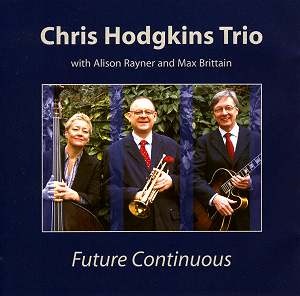Sweet William (A. Rayner) [4:07]
Full Count (C. Candoli) [3:24]
Breaking Up Is Hard To Do (N. Sedaka) [3:14]
Grey Skies (E. Harvey) [3:23]
To Summer (K. Dyson) [3:50]
Marabastad (M. Mokone) [3:19]
Where’s Trog? (E. Harvey) [4:44]
My Heart Stood Still (Rogers and Hart) [2:50]
No Silence in the Lamb (H. Lowther) [3:23]
Here There And Everywhere (Lennon and McCartney)
[2:26]
Funk Dumplin’s (S. Shihab) [4:05]
If Only (R. Sutherland) [3:03]
Phalanges (L. Bellson) [2:49]
Mezzrow / Mezz’s Tune (H. Lyttleton) [2:55]
If We Never Meet Again (H. Gerlach / L. Armstrong)
[3:16]
Urban Cowboy (D. McLoughlin) [3:40]
Birk’s Works (D. Gillespie) [4:25]
Taking A Chance on Love (J. LaTouche, T. Fetter,
V. Duke) [4:09]
Overture from Water Music (Telemann, arr.
H. Lowther) [2:49]
Swinging At The Copper Beech (C. Hodgkins)
[3:33]
Chris Hodgkins (trumpet)
Max Brittain (guitar)
Alison Rayner (bass)
Rec. 25-26 February, 2006, Dronken Lane Studios,
Hertfordshire, England
Chris Hodgkins’s sterling
work as director of Jazz Services Ltd. has
perhaps distracted attention from his own
considerable merits as a trumpeter. This CD
should go a long way towards redressing the
balance.
No listener to this CD could
be left in any doubt as to the certainty of
Hodgkins’s technique on his instrument; nor
of the imagination and sensitivity of his
playing; nor, indeed, could a listener be
left in any doubt of his musical intelligence,
evident both in the choice of a splendidly
various programme and in the way his trumpet
work functions as one of the elements in a
wonderfully interactive intimacy with the
other members of his trio. The whole thing
is delightfully eclectic – here is a programme
that ranges from Candoli (Conte) to Telemann
(Georg Philipp), from Lennon and McCartney
(John and Paul) to Shihab (Sahib) and from
Sedaka (Neil) to Lyttleton (Humphrey).
Everything in the programme
is played with subtlety and alertness. Hodgkins
handles both open horn and variously muted
trumpet with equal assurance and conviction.
There are gorgeous tone colours, attractive
melodic runs and some unexpected, but never
disturbing, harmonic touches. As Digby Fairweather’s
appreciative sleeve notes observe, one of
the distinctive virtues of Hodgkins’s trio
is their ability to work on a small canvas,
to resist the temptations of improvisational
garrulity, and to say what they have to say
succinctly, aware, as it were, of the old
advice to "leave them wanting more".
The longest track here (‘Where’s Trog’) clocks
in at 4:44 and Wally Fawkes wouldn’t have
found anything to object to in its ‘length’.
Most of the tracks come in well under four
minutes (sometimes under three) and, in truth,
only occasionally does one ‘want more’ – in
most cases one feels that the statement has
been perfectly made, the ideas have, although
not exhausted, been presented with a concision
which would make further expansion largely
redundant.
The quality of Chris Hodgkins’s
work is, of course, dependent on the support
that he is given by the other two members
of his trio. And how fortunate he is to receive
that support from such fine musicians as Alison
Rayner and Max Britain; both make telling
contributions as soloists but, above all,
are admirably sensitive and proactive accompanists.
Chris Hodgkins couldn’t reasonably
be described as especially original or even,
perhaps, as an exceptionally individual stylist
on his instrument. Rather he is a cultured
musician, educated in the idioms of the jazz
trumpet and able to draw selectively from
the history of the jazz trumpet for his own
purposes – echoes of Ruby Braff or Roy Eldridge,
early Miles Davis or of Armstrong himself,
are part of a larger conversation with the
traditional jazz language of his instrument.
The result is seventy minutes of civilised,
richly intelligent music, full both of echoes
and inventions. The album title, perhaps,
affirms the future of such a past? Warmly
recommended.
Glyn Pursglove
